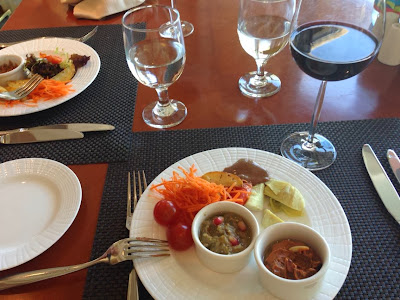Our taxi slowed respectfully as it passed though the elegant entrance of the Al Bustan Palace Hotel.
The lawns rolled and stretched away on either side and the palm trees bowed in welcome as we slowed before the magnificent edifice before us - The Al Bustan Palace Hotel.
It was built as a palace and it remains a palace, the hotel having merely moved quietly and discretely into the vast and airy canopy and its adjacent wings without disturbing its serene cloisters and princely passages.
Inside, we almost genuflect - it is a temple too, a vast dome soars up and shafts of divine light slice through the fragranced atmosphere.
If you've been having a tough time of it, and you need a break, this is the place to come. The staff are razor sharp on every doubt and potential need, solicitous without being in the slightest bit oleaginous or Uriah Heep.
We were welcomed by Mara Isono, EAM Secretary, who introduced us immediately to Mohammed, sitting with his friends who immediately become our friends, and served us Arabian coffee and dates.
We were overawed by the infinite sense of indulgence promised in every stone and every friendly glance.
Mara led us into the gardens, which must have been sculpted by the same landscape gardeners responsible for the Elysian Fields and The Garden of Eden, with maybe a contribution from the Augustus golf course in Atlanta.
Lunch was a buffet, but that term is inadaquate to the task of conveying the exquisite range of texture and flavour that we were treated to and the genuine attentiveness of our waiter.
The great philosopher Wittgenstein said, 'Whereoff you cannot speak, thereoff you must remain silent'.
He also said that somethings cannot be said, they can only be shown.
Until today, I didn't really know what he meant by either of these statements.
I do now.
The lawns rolled and stretched away on either side and the palm trees bowed in welcome as we slowed before the magnificent edifice before us - The Al Bustan Palace Hotel.
It was built as a palace and it remains a palace, the hotel having merely moved quietly and discretely into the vast and airy canopy and its adjacent wings without disturbing its serene cloisters and princely passages.
Inside, we almost genuflect - it is a temple too, a vast dome soars up and shafts of divine light slice through the fragranced atmosphere.
If you've been having a tough time of it, and you need a break, this is the place to come. The staff are razor sharp on every doubt and potential need, solicitous without being in the slightest bit oleaginous or Uriah Heep.
We were welcomed by Mara Isono, EAM Secretary, who introduced us immediately to Mohammed, sitting with his friends who immediately become our friends, and served us Arabian coffee and dates.
We were overawed by the infinite sense of indulgence promised in every stone and every friendly glance.
Mara led us into the gardens, which must have been sculpted by the same landscape gardeners responsible for the Elysian Fields and The Garden of Eden, with maybe a contribution from the Augustus golf course in Atlanta.
Lunch was a buffet, but that term is inadaquate to the task of conveying the exquisite range of texture and flavour that we were treated to and the genuine attentiveness of our waiter.
The great philosopher Wittgenstein said, 'Whereoff you cannot speak, thereoff you must remain silent'.
He also said that somethings cannot be said, they can only be shown.
Until today, I didn't really know what he meant by either of these statements.
I do now.




















